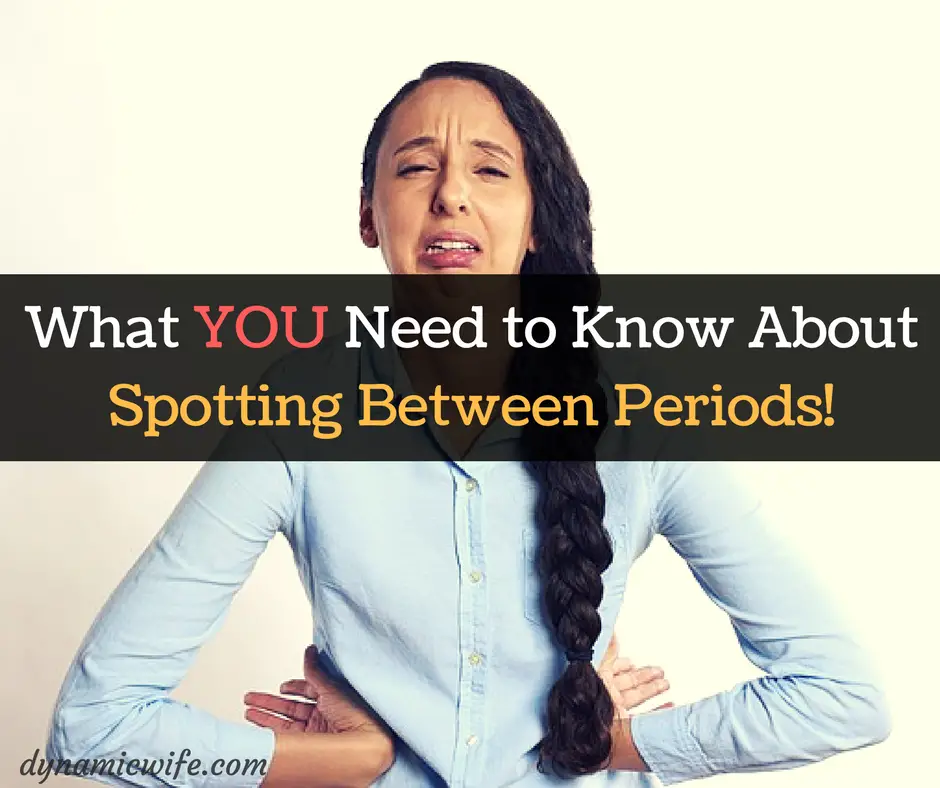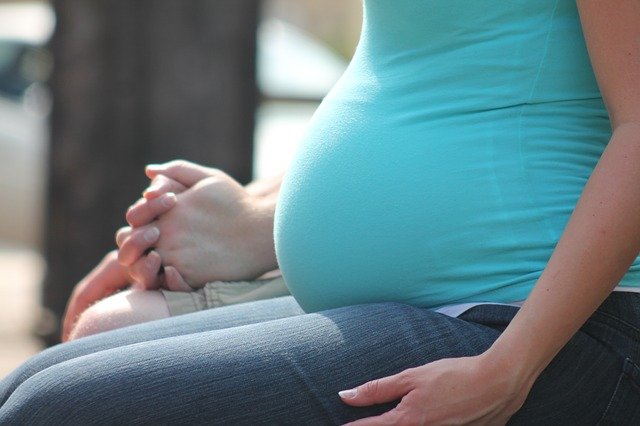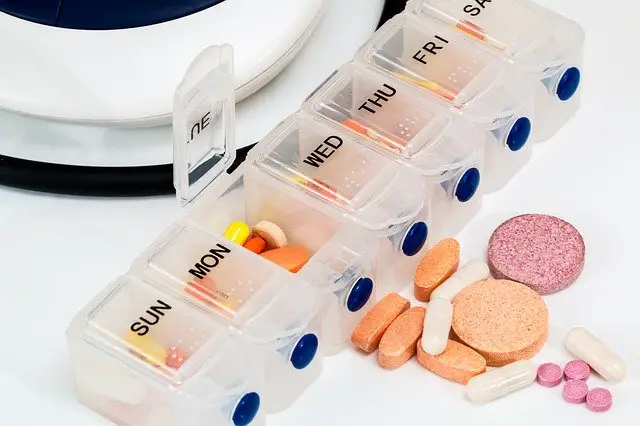Here’s everything you need to know about spotting between periods.

In March 2018, Aunt Flo visited me twice and it wasn’t fun.
Once at the beginning of the month for 3 whole days and then again towards the end of the month for 4-5 days.
That’s 2 periods. Just when I was freaking out a little and calming down, I had another period 9 days after my last.
SEE ALSO: Why you have itchy swollen vag lips without discharge
This time I wasn’t going to sit around hoping for the next month to be better.
I went and got my blood test and urine test done.
It turns out I had Hyperthyroidism and one of the popular symptoms of Hyperthyroidism is irregular periods.
That’s when I decided to dig deeper into this topic of spotting between periods and have put together this guide so you can all learn about it in simple words.
Spotting Vs Vaginal Bleeding
Vaginal bleeding, on the other hand, is when you have a heavy flow of blood that looks like your period but comes when your period is not due. Both cases are abnormal if they occur without any valid reasons such as implantation bleeding, for instance, more on this in a bit.
Menstrual Cycle Facts

Before we discuss the causes of irregular bleeding between periods, here are some facts to keep in mind about your menstrual cycle [1].
- The length of your menstrual cycle is calculated from the first day of your period until the day before your next period begins.
- The average length of a period for most women is said to be between 25-30 days.
- Period cycles that are less than 21 days are called polymenorrhea and cycles that are longer than 35 days are termed as oligomenorrhea.
- The average volume of blood lost per period cycle is said to be 30ml and anything more than 80 ml is abnormal.
- Periods are most irregular when you have your first period known as Menarche and then menopause in later life.
Top 10 possible causes of spotting between periods
These are some of the most common causes of spotting before, after, or between periods.
Implantation bleeding

This is probably one of the widely searched causes of spotting between periods for women who’re sexually active, especially for those who’re trying to conceive.
But a lot of women confuse it with irregular bleeding or just an unexpected visit from Aunt Flo.
I was one of them.
We’ve been actively trying to conceive since February and I’ve confused irregular vaginal bleeding for implantation bleeding simply because the blood was lighter on the first day.
Another irritating fact is that implantation bleeding is supposed to come a few days before your period is due so it’s hard to tell the difference at first.
So could your spotting between periods be due to implantation bleeding?
If you’ve been sexually active without using any form of contraceptives and/or if you’re trying to conceive, who knows, it just might be. But don’t count on it until you get a positive from your doctor.
How do you tell if your spotting is implantation bleeding or just bleeding?
- It’s important to remember that not all women get implantation bleeding and for those that do, it’s very light spots of blood that ranges from pink to brownish red in color.
- Implantation bleeding usually doesn’t have blood clots like your regular periods.
- It can last for a few minutes to few hours to 2-3 days maximum.
- Implantation bleeding will not fill up your pad or tampon-like regular periods.
So what to do if you think it’s implantation bleeding?
It’s nothing harmless so just wait a few more days to be extra sure and then take a pregnancy test. If you don’t trust the result of your home pregnancy test, get a blood test done by your doctor to see if you’re pregnant.
2. Hyper and Hypothyroidism
As mentioned earlier, I kept confusing my irregular bleeding between periods with implantation bleeding but have been diagnosed with Hyperthyroidism.
It’s one of the most common causes of spotting between periods or bleeding between periods.
So what’s the link between thyroid and your spotting?
The thyroid is the lumpy organ that surrounds the Larynx (voice box) in your throat. It’s what forms Adam’s apple in our neck when we swallow. Some people say I have Thyroid like having thyroid is a disease, no. We all have it and it’s an organ responsible for releasing thyroid hormones needed for bodily functions [2].
It’s all good until the thyroid gland decides to release too many or too little thyroid hormones into the body.
People with Hyperthyroidism have an overactive thyroid gland that produces too many hormones and those with an underactive thyroid produce too little hormones.
Both of these conditions can create a hormonal imbalance in your body and in women this can lead to irregular spotting and bleeding between periods.
In a 2016 study conducted in India, they found that 44% of the women participants with menstrual disorders had thyroid problems and concluded that thyroid dysfunction is an important cause of menstrual abnormalities [3].
Hypothyroidism can cause Oligomenorrhoea and Menorrhagia.
Can you pronounce those words at first go?
I sounded like Dory when I attempted to pronounce them.
Oligomenorrhea is when you have infrequent and usually light menstrual cycles. It is also when your period cycle is longer than 35 days as mentioned earlier. There are several causes of this condition but the most popular causes are hormonal imbalance caused by thyroid problems, birth control pills, and it can also occur in women who do heavy exercise or sports.
Menorrhagia is when your period is abnormally heavy. These 2 conditions usually don’t cause any serious problems on their own, other than making it harder to conceive, but they can later develop into serious issues which is why it’s important to have them under control.
So what to do if you think your spotting between periods is due to thyroid problems?
If you’re not sexually active and/or have ruled out pregnancy a negative result, the next best thing you can do is to get your thyroid test done.
Getting it done will help get your hormonal imbalance on track and also increase your chances of conceiving if/when you choose to.
Thyroid medications are usually taken forever but your doctor will increase or decrease your dosage depending on how your thyroid glands progress after a month of taking the med.
3. Birth Control Pills
Birth control pills have been designed for women who wish to be sexually active without getting pregnant and it’s one of the most popular forms of contraceptives used by women worldwide. These pills are usually taken every day.
Birth control pills work in a number of ways which include:
- Controlling the hormone functioning of the ovaries.
- They prevent ovulation (egg release) from taking place so there’s no egg to be fertilized when a sperm enters a woman’s body.
- Some pills can prevent the implantation of fertilized eggs into the womb.
- Some can make it difficult for the sperm to reach the egg by making the cervical mucus to become thick and sticky.
Birth control pills are only effective if they’re taken every single day because if someone forgets to take it for one day, there’s a chance that her ovaries may release an egg and the woman can get pregnant if she has intercourse during her fertile time.
How does birth control pill cause spotting between periods or irregular bleeding?
Birth control pills have been known to cause lighter periods which some women may appreciate but it can also cause a bunch of side effects such as nausea, vaginal infections, and reduce libido in some women [4].
Also, the reason for lighter periods when on birth control is because they can prevent the uterus lining from thickening so there’s not much blood to be shed when your period is due.
One of the popular side effects of birth control pills is that they can cause spotting between periods and some can cause you to miss your periods for months.
Spotting is more common with the Progestin-only pills than the combination pills which contain both progestin and estrogen. If you’re on birth control pills, spotting can also happen if you skip the pill or forget to take it at the right time.
What to do if you think your irregular bleeding is due to birth control pills?
See your doctor If you have symptoms such as painful periods, bleeding after intercourse, or super heavy period that seems like it’s never going to stop.
4. Stress
Is there anything stress doesn’t have an effect on?
In fact, “Are you stressed by any chance?” is one of the questions my doctor asked me when I told her about my sudden irregular bleeding.

Stress definitely plays an important role in your menstrual health. Sometimes stress can have an effect on your period even if you’re on the birth control pills.
Stress can confuse your body into thinking that producing stress-related hormones is more important right now than taking care of the reproductive hormones responsible for healthy periods.
When you’re under stress, your brain thinks and acts as if you’re in danger and tries its best to take care of the stress hormones first.
So what it does is it uses up Progesterone to produce more of the stress hormone Cortisol which eventually lowers the production of progesterone your body. As a result, your body will have a low level of Progesterone and high level of Estrogen.
This then becomes the hormonal imbalance issue that can cause you to have spotting between periods and/or bleeding between periods.
Another thing is, stress can also delay or prevent ovulation which in turn can result in spotting or early period because of the thin uterus lining.
So yes, stress can not only have a negative impact on your menstrual cycles but it can also make it difficult to conceive a child if/when you want to.
What to do if you think your spotting between periods is caused by stress?
Take a deep breath and start relaxing because that will take care of the negative impacts of stress on your period cycle. If in doubt, just get a blood and urine test to block out any other conditions that could have caused it like Hyperthyroidism for example.
If you know you’ve been going through a lot of stress lately, that’s something you might want to address first. Also, stressing about your period can also further increase stress and all that it’s doing to your bodily functions.
5. A rough moment with your partner

Bleeding during or after intercourse is pretty common and harmless as long as it’s under control. However, it’s quite fascinating when you think about the fact that our vaginal muscle is so strong enough to squeeze out a whole human and still sensitive when it comes to things like a rough ehem with your partner.
So here are some reasons why you could have spotting between periods because of rough intercourse:
- Vaginal dryness: Every woman will experience the vaginal drought at some point in her life. It happens when the vaginal tissues are not lubricated properly and it’s common for all ages but more noticeable in older women, especially in menopausal women. It’s caused by a drop in Estrogen level which is responsible for keeping your vagina lubricated.
Some symptoms of vaginal dryness include itching and swelling of the vaginal lips, pain during intercourse, and bleeding after intercourse. Some main causes of vaginal dryness are breastfeeding or childbirth, menopause, having intercourse before being aroused, douching, and some types of cancer treatments can also cause it.
- Minor tearing of the vaginal walls: Sometimes when things get too rough inside your vagina, it can cause some minor tearing of its wall tissues and result in some bleeding after intercourse. The opening of your vagina can also get hurt during rough intercourse and result in bleeding sometimes.
It’s not the case for everybody but some women are more sensitive than others so yeah it can happen.
- Vaginitis: It’s a vaginal infection that can cause abnormal discharge, itching, and pain. It’s usually caused when the normal PH balance of your vagina is disturbed by things like douching for instance and low level of estrogen due to menopause is also a common cause of vaginitis.
The three main types of vaginitis are Bacterial Vaginosis, Yeast infections, and Trichomoniasis.
So if you’re experiencing any of the symptoms of Vaginitis, chances are your spotting between periods could have also been caused by it.
6. Pregnancy bleeding

Light bleeding during early pregnancy is actually very common among many women and although it can be harmless in most cases, sometimes it could also be because of a miscarriage or an ectopic pregnancy [5].
The first possible reason for bleeding during pregnancy is implantation bleeding. Not everyone will experience it, but for those who do, it usually occurs 6-12 days after the fertilized egg has implanted itself in the lining of the uterus.
As mentioned earlier, implantation bleeding is usually very light and lasts for few hours- few days and it’s not heavy like a regular period.
Bleeding during pregnancy can sometimes indicate a miscarriage but if the heartbeat of the baby can be seen on ultrasound then it will usually lead to a healthy pregnancy [6].
If you’re sexually active without using any contraceptives and/or if you’re trying to get pregnant and see an unusually heavy bleeding with tissue clots, check up with your doctor immediately to make sure it’s not a miscarriage.
If you suspect or know that you’re pregnant and experience spotting or bleeding, another possible cause for that could be an ectopic pregnancy.
What that means is that the fertilized embryo has implanted outside the uterus (in the fallopian tube) instead of inside. If the embryo continues to grow on the outside, it can cause the fallopian tube to burst which can cause fatal consequences to the mother.
Progestogen-only contraceptives and intrauterine contraceptives have been found to be one of the factors that increase the chances of an ectopic pregnancy. 1/3rd of all cases of EP are associated with smoking mothers and the risk is also higher for women aged 35+ [7].
What to do if you think you’re having a miscarriage or ectopic pregnancy bleeding?
If you know you have chances of being pregnant and are bleeding with/without pain, it’s better to get it checked out right away because EP is not something to be taken lightly as it can be deadly for the mother.
7. Polycystic Ovary Syndrome (PCOS)
Another most common cause of bleeding or spotting between periods is Polycystic Ovary Syndrome (PCOS). It’s also a condition that often goes underdiagnosed but not can result in consequences such as not being able to conceive and messing up your periods.
If you have PCOS, that means you have more androgen (male hormone) than you should, resulting in a hormonal imbalance. It’s usually a genetically inherited disorder but environmental factors such as obesity can also increase the risk [9].
Trouble losing weight, missed and/or bleeding between periods are also some unnoticed symptoms of PCOS. You might also notice that you’re growing more body and/or facial hair and feeling exhausted all the time.
If you can relate to these symptoms, it’s time to let your doctor know about it and have those check-ups done as early as you can for a faster recovery.
There’s no single test diagnosis for PCOS. Your doctor will usually ask you questions about your symptoms and then also take your blood test/urine test first. They might then take a pelvic exam and ultrasound scan for further clarifications.
8. Pelvic Inflammatory Disease

Another high-risk cause of your spotting between periods is Pelvic Inflammatory Disease (PVD). It’s an infection of a woman’s reproductive system, mainly the fallopian tubes and it increases the chances of infertility, ectopic pregnancy, and chronic pelvic pain [8].
PVD is usually caused by sexually transmitted infections like Chlamydia and Gonorrhea. It’s often underdiagnosed because the symptoms don’t usually show until the infection worsens.
When in doubt, your physician will connect symptoms such as abnormal vaginal discharge, abnormal bleeding, and frequent urination with PVD to check if you have it. They would make it a must if it’s confirmed that you also have any types of STIs.
If you’re sexually active, screening for Chlamydia and getting treatment for it if you’ve been diagnosed can also help prevent PID.
9. Medications

Being on certain medications can also cause irregular periods or bleeding between periods. We already discussed birth control pills and other than that, common meds like Warfarin and Aspirin can also interfere in your menstrual cycle.
These medications help prevent blood clots and as a result, you might experience unusually heavy bleeding during or between periods.
On the other hand, if you take painkillers such as ibuprofen or naproxen on a regular basis, these can make you have lighter periods.
Some thyroid medications have also been linked to irregular periods.
Antidepressants are another powerful form of medications linked to menstrual disorders. Taking antidepressants can have side effects such as menstrual pain, irregular bleeding or even cause you to miss your period sometimes.
Therefore if you’re on any of these medications, do consult with your doctor about your period issues to make sure it’s nothing serious.
BOTTOM LINE: The above information is just to give you an idea of the possible reasons for your irregular bleeding or periods. Unless you can confirm that it’s because of something like your medications or due to stress, please visit your doctor for a checkup if you have spotting or irregular bleeding every month.
If you’re sexually active without using contraceptives and/or are trying to get pregnant, irregular bleeding is not something you should take lightly as it can link to things like a miscarriage or an ectopic pregnancy. Polycystic Ovarian Syndrome is also a popular cause of irregular periods and that’s something you should definitely mention to your doctor if you have several of the PCOS symptoms.